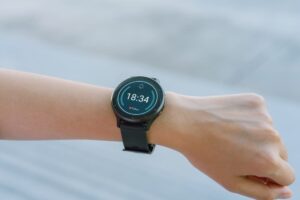
xWearable technology – like fitness trackers and smartwatches – has become a daily companion for many. Devices like the Apple Watch track steps, monitor heart rates, and even detect sudden movements. But beyond fitness insights, wearable data is starting to play an unexpected role in legal cases, including car accident claims.
What Is Wearable Data?
Wearable data is essentially the information collected by devices worn on your body, such as smartwatches, fitness bands, or other health monitors. These devices track various metrics, like heart rate, physical activity, and even sleep patterns, providing a snapshot of your daily physical health. In the context of a car accident case, data from wearables could offer evidence of your physical state before, during, and after the accident.
Fitness trackers and other wearable devices that may record this information include:
- Apple watch
- Samsung Galaxy watch
- Fitbit
- Garmin
- Quora Ring
The potential to use wearable data as evidence is an emerging area in the legal field. While it’s promising, there are also legal issues with wearable technology to consider. Can this data really support an accident claim? And how can it be used in a way that respects privacy laws?
How Wearable Data Could Help Your Car Accident Case
Imagine you’ve been in a car accident. Recalling every moment can be challenging, especially as emotions run high. In some cases, data from a wearable device can fill in the gaps. For example, if your Apple Watch recorded a sudden spike in heart rate or detected a rapid stop at the time of impact, this information could back up your account of the accident. Data like this can show how your body reacted to the collision, offering evidence that aligns with your story.
Wearable data could also reflect how the crash affected your life afterward. If you were highly active before but show a significant drop in activity post-accident, this data might support your claim of injury and its impact on your daily life.
How Wearable Data Can Hurt Your Car Accident Case
While wearable data could potentially help your case, it could also harm it. If the information on your fitness tracker is inconsistent with your statements about your health, the insurance company could claim you are lying, faking, or exaggerating about your injuries or how the crash occurred. The defendant could try to question your credibility in court, which could damage your claim. It’s vital you work with a personal injury lawyer who is experienced in handling emerging technology and its admissibility in court.
What Type of Legal Protection Do Fitness Trackers Provide?
Devices like the Apple Watch are designed to protect user privacy. This means that a third party who wants to access wearable data for legal purposes may require legal permission. Privacy laws in the U.S. protect wearable technology users, making it difficult for anyone to obtain this data.
Privacy Concerns and Accessing Health Data
Privacy is a crucial consideration when using wearable data in court. Imagine if sensitive health information stored on your smartwatch could be accessed without restrictions. Understandably, this would raise concerns. Generally, obtaining wearable data for a legal case involves following strict legal procedures, often requiring a subpoena to ensure that personal privacy is respected.
In some cases, attorneys may need to request access to this data through legal channels, such as a subpoena or letter of spoliation. Manufacturers like Apple are known to protect user privacy, so attorneys must show that the data is both relevant and necessary for the case, balancing the need for evidence with an individual’s right to privacy.
How Can I Get Wearable Data Admitted in My Case?
To make your Apple Watch legal case, you must show that the wearable data meets legal standards for evidence. You must show that it is authentic and relevant. Working with an attorney experienced in technology-driven cases can help ensure the data is handled correctly. From authenticating the data to verifying its accuracy, attorneys may work alongside tech experts to confirm the data’s integrity and demonstrate its relevance to the case.
Contact Cain Law to Learn More About Your Legal Rights
At Cain Law, we’re committed to staying on top of the latest tech developments on behalf of our clients. With over $100 million won for Oklahoma clients, we stand ready to bring every resource to your side. Contact us today for a free consultation, and let’s discuss your case together.
In pain? Call Cain.


















